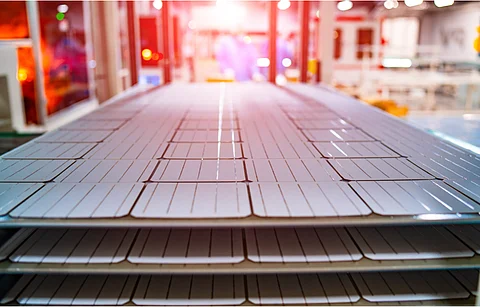

The German Ministry of Economics and Climate Protection (BMWK) has launched an expression of interest (EOI) to support capex for a total of around 10 GW annual solar PV manufacturing capacity in the country along the value chain, based on the latest technological and sustainable developments.
These 'lighthouse' projects will need to propose a minimum of 2 GW module production capacity for panels having over 24% efficiency and 0.2%/annum degradation from 1 year after assembly.
Requirement is also for the production process to not involve soldering, and use antimony-free solar glass. These should also be sans lead/bismuth. Use of nitrogen oxides in PV cell manufacturing is also not welcome, nor is the use of PFAS chemicals.
Instead, the EOI stresses on the environmental aspects of PV manufacturing as it needs suppliers to demonstrate a total carbon footprint of less than 18 gms/kWh.
"Specifically, the BMWK wants to grant flagship projects, especially in structurally weak regions, grants according to the so-called matching clause up to the amount that an equivalent investment project in a third country would demonstrably receive," stated the ministry. "This is intended to prevent distortions of competition to the detriment of Germany as a business location and to keep the country attractive as a location for PV producers."
Funding is subject to the ongoing state-aid under the under the European Commission's state-aid framework Temporary Crisis and Transition Framework (TCTF) and budget negotiations, according to the ministry.
"We need our own production capacities in Germany and Europe for central transformation technologies. This is not only a question of economic reason, but also a question of economic security. The EU 's new subsidy framework offers opportunities for this, and we want to take advantage of them," said BMWK Minister Robert Habeck.
Announced on June 19, 2023 in the Federal Gazette, the EOI is open for submissions till August 15, 2023. Details are available on Germany's Federal Gazette website.
Germany has been working on its Photovoltaic Strategy under which it targets 11 GW annual installations for ground mounted and rooftop PV each from 2026, under its overarching aim for 215 GW installed PV capacity by 2030. Part of the plan is to allow ensure ease of business for the PV value chain in Germany (see Revised Photovoltaic Strategy).
Earlier this month, during the Regional Conference of the Heads of States of Eastern German States, German Chancellor Olaf Scholz said in its quest to have 80% of electricity coming from renewable energies by 2030, the government will support renewables, especially solar PV with accelerated planning and construction processes.
Financial support will be provided too till the time the industry can pay for itself 'because a good economy pays taxes and is not paid for by the state'. Scholz said the first investments in such a capital-intensive field will lead to upheavals. The government will help make the upheaval possible, 'because we believe that at some point it will pay for itself'.
.png?w=50&fm=png)